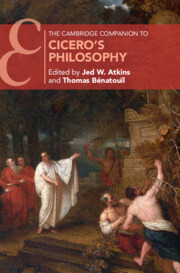Book contents
- The Cambridge Companion to Cicero’s Philosophy
- Series page
- The Cambridge Companion to Cicero’s Philosophy
- Copyright page
- Dedication
- Contents
- Contributors
- Preface
- Cicero’s Philosophical Works
- A Note on Abbreviations
- Introduction
- Chapter 1 Cicero’s Philosophical Writing in Its Intellectual Context
- Chapter 2 The Ciceronian Dialogue
- Chapter 3 Philosophy in Cicero’s Letters
- Chapter 4 Philosophy in Cicero’s Speeches
- Chapter 5 Cicero and the Creation of a Latin Philosophical Vocabulary
- Chapter 6 Cicero and Plato
- Chapter 7 Cicero’s Academic Skepticism
- Chapter 8 Cosmology, Theology, and Religion
- Chapter 9 Determinism, Fate, and Responsibility
- Chapter 10 Cicero on the Emotions and the Soul
- Chapter 11 Ethical Theory and the Good Life
- Chapter 12 Nature and Social Ethics
- Chapter 13 Philosophy, Rhetoric, and Politics
- Chapter 14 Cicero’s Republicanism
- Chapter 15 Empire, Just Wars, and Cosmopolitanism
- Chapter 16 Cicero and Augustine
- Chapter 17 Cicero and Eighteenth-Century Political Thought
- Chapter 18 Cicero and Twenty-First-Century Political Philosophy
- Bibliography
- Index of Cicero’s Texts
- General Index
- Series page
Chapter 13 - Philosophy, Rhetoric, and Politics
Published online by Cambridge University Press: 08 December 2021
- The Cambridge Companion to Cicero’s Philosophy
- Series page
- The Cambridge Companion to Cicero’s Philosophy
- Copyright page
- Dedication
- Contents
- Contributors
- Preface
- Cicero’s Philosophical Works
- A Note on Abbreviations
- Introduction
- Chapter 1 Cicero’s Philosophical Writing in Its Intellectual Context
- Chapter 2 The Ciceronian Dialogue
- Chapter 3 Philosophy in Cicero’s Letters
- Chapter 4 Philosophy in Cicero’s Speeches
- Chapter 5 Cicero and the Creation of a Latin Philosophical Vocabulary
- Chapter 6 Cicero and Plato
- Chapter 7 Cicero’s Academic Skepticism
- Chapter 8 Cosmology, Theology, and Religion
- Chapter 9 Determinism, Fate, and Responsibility
- Chapter 10 Cicero on the Emotions and the Soul
- Chapter 11 Ethical Theory and the Good Life
- Chapter 12 Nature and Social Ethics
- Chapter 13 Philosophy, Rhetoric, and Politics
- Chapter 14 Cicero’s Republicanism
- Chapter 15 Empire, Just Wars, and Cosmopolitanism
- Chapter 16 Cicero and Augustine
- Chapter 17 Cicero and Eighteenth-Century Political Thought
- Chapter 18 Cicero and Twenty-First-Century Political Philosophy
- Bibliography
- Index of Cicero’s Texts
- General Index
- Series page
Summary
Cicero conceives of rhetoric, politics, and philosophy as so interconnected that they are, or at least should be, a unity under the rubric “eloquence.” To be sufficiently capacious to include all three, eloquence means something different to Cicero than to us, with its current meaning of fluent or persuasive expression. Rather than simple (or even outstanding) facility in language, eloquence for Cicero is public speech, especially political speech, rooted in wisdom. Cicero, most especially in his rhetorical masterpiece, De oratore, deems the eloquens, the man of (true) eloquence, to be the perfect orator, who is simultaneously the ideal statesman, articulating his ideas in words so powerful that he can move his audience in whichever direction he so desires. Because of the danger inherent in such forceful persuasion, the eloquent orator must apply his rhetorical skills only after having acquired “all-embracing knowledge.” Thus, Cicero’s orator-cum-statesman is also a philosopher of a sort – a philosopher who is a man of action, who uses his wisdom to promote the common welfare, unlike those philosophers who shirk “politics and its responsibilities on deliberate principle,” and who criticize and scorn the orator-statesman’s practice of speaking.
Keywords
- Type
- Chapter
- Information
- The Cambridge Companion to Cicero's Philosophy , pp. 200 - 214Publisher: Cambridge University PressPrint publication year: 2021

